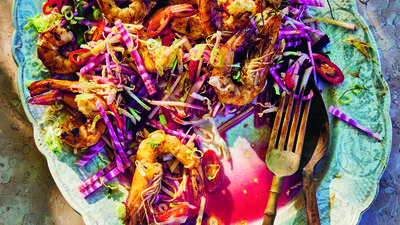
Toni Tipton-Martin is an acclaimed food writer and the author of The Jemima Code, a book that presents the history of African-American cooking told through 200 years of black cookbooks. It paints a picture of a cuisine that’s more diverse, technical, and sophisticated than the stereotypes of black food. For our tribute episode Edna Lewis, an American Original, Francis Lam wanted to talk to Tipton-Martin about her personal connection to Edna Lewis, and the inspiration and encouragement she received directly from the legendary writer.
Francis Lam: How did you meet Ms. Edna?
Toni Tipton-Martin: Ours was a chance meeting. Many, many years ago when I was a young journalist at the Los Angeles Times and I attended a conference that she was at. And I'm embarrassed to say that I did not know who she was, but she was surrounded by adoring fans who did know. So, I went over to introduce myself to her and find out what it was that made her so special. And it didn't take long for me to figure that out.
FL: What impressed you about her?
TTM: Well, you know, I have to say that my initial reaction was clearly one of her physical stature. Sort of like going on that first blind date, you have that attraction and you don't know anything about the person. But she was so incredibly beautiful and statuesque and so poised, intelligent, and clear-headed. Not to say that other African American women aren't that. It's just that that's the impression that she leaves.
FL: Yeah, It's amazing because so many people describe her as being regal. And I found out years later that her middle name was in fact Regina, right. It's like she was fated to that.
TTM: Wow. I don't know if I knew that.
FL: Yeah. It's wild.
TTM: Well, you know, we get stuck sometimes in making physical observations, but I have to say that given the work that I've been doing and how it started in my desire to find an alternative view of African American women in the food world, I don't guess I can escape the fact that what she looked like made a huge impression on me as well. Because she was so contrary to the stereotype myth of an Aunt Jemima mammy character as being the representation of an African American woman in the kitchen. And my goal with all of my work is to use African American cooks as an example of people who have been disparaged and spoken about prejudiciously, and they have so much that they can offer and share.
FL: Yeah, and you met her again later.
TTM: I did. I met her again later. By then I had moved from Los Angeles to Cleveland to become the food editor there. And there was a dinner in Washington, D.C. that spotlighted African American chefs and I have a wonderful memory and photograph of being seated with Ms. Lewis and Leah Chase. And you know, it's just one of those things that I treasured for a long time. And again, I still had not explored their work deeply because I was busy raising a family and being a food editor… but it was their presence that was so compelling and engaging. They invited you into their kitchens through their hearts and their words. And so, I became even more curious to know more about both of them.
FL: And Leah Chase is another icon, the chef of Dooky Chase in New Orleans. But you got a letter from Ms. Lewis at one point, right?
TTM: I did. It was so important and such an amazing surprise for me, because she had become so important to me in the ideas that I was starting to formulate about promoting African American food ways and especially telling the stories of African American cooks. And then along comes this hand-written letter in my office inbox. And what she does is so warm, she explains right away with a timestamp that she's up in the middle of the night, and that a conversation that she and I have had is disturbing her and she had to get up and write to me. She wanted to encourage me to pursue the story of African Americans in the food world and she closed with, “Leave no stone unturned.”
She wanted to me to know that there was value in what I was pursuing and she gave me that validation and that encouragement to go forward and to press on no matter how difficult the task might become. And she made me feel confident in the idea that, yes, African American cooks needed to be elevated in the American food story. And so, I got over feeling inadequate and insecure, which maybe she picked up on and that's why she wrote me this letter. Which would make sense because that's the kind of writing she did in her books, as if she were standing with you, side by side, walking you through how to make a recipe and telling you where the pitfalls might be. And so, I think that I hadn't really thought about it until just now, but I think that letter to me was the kind of encouragement that she wrote in her cookbooks. And it was to say, “You can do this. I'm with you.”
FL: Incredible.
TTM: It makes me a little weepy thinking about it.
FL: I understand totally. I can only imagine what that must feel like. Thank you so much, Toni.
TTM: Well, thanks for having me and giving me a chance to speak about a woman who's important to me but also important to us all.
Before you go...
Each week, The Splendid Table brings you stories that expand your world view, inspire you to try something new, and show how food connects us all. We rely on your generous support. For as little as $5 a month, you can have a lasting impact on The Splendid Table. And, when you donate, you’ll join a community of like-minded individuals who love good food, good conversation, and kitchen companionship. Show your love for The Splendid Table with a gift today.
Thank you for your support.
Donate today for as little as $5.00 a month. Your gift only takes a few minutes and has a lasting impact on The Splendid Table and you'll be welcomed into The Splendid Table Co-op.




